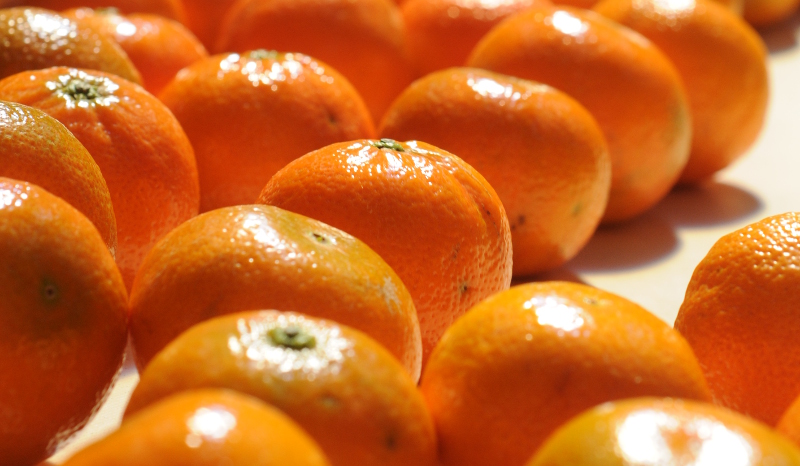Perishables news
by USDA APHIS
Effective immediately, the Animal and Plant Health Inspection Service (APHIS) is lifting the Federal Order (DA-2016-79) issued December 23, 2016, which prohibited the importation of tangerines, clementines, mandarins (Citrus reticulata), and sweet oranges (Citrus sinensis) produced in, moved through, or shipped from the Berkane Region in Morocco into the United States.
Prior to the Federal Order prohibiting such imports, tangerine, clementine, mandarin, and sweet orange fruit could be imported to the United States subject to commodity import requirements and operational work plan (OWP) safeguards. APHIS took action to ban the citrus due to the detection of live Mediterranean fruit fly (Medfly) larvae in Berkane citrus at a U.S. port of entry.
In October 2017, APHIS personnel conducted a site visit to examine places of production, packinghouses, means of conveyance, and port of export in the Berkane Region of Morocco. Following the site visit, APHIS and Morocco’s national plant protection organization (ONSSA) modified the OWP to include additional safeguards in orchard surveying and fruit cutting protocols, and procedures for pre-cooling and temperature readings at packinghouses and upon loading at the port of export. APHIS determined that the new measures specified in the OWP effectively mitigate the pest risk and the Federal Order can safely be removed.
APHIS is permitting commercial imports of tangerine, clementine, mandarin, and sweet orange fruit from all regions, including Berkane in Morocco, into the United States subject to the commodity import requirements. The citrus must be exported in accordance with the OWP which includes a systems approach consisting of orchard and packinghouse registration, Medfly trapping, packinghouse inspections and fruit cutting, lot identification, cold treatment, phytosanitary certificate, and inspection upon arrival. Commercial consignments of citrus fruit from Morocco require a phytosanitary certificate with additional declaration stating the consignment was produced and prepared for export in accordance with the OWP agreement between APHIS and ONSSA.
For additional information regarding this Federal Order, please contact Senior Regulatory Policy Specialist Dorothy Wayson at Dorothy.C.Wayson@aphis.usda.gov or 301-851-2036.
Osama El Lissy
Deputy Administrator
Plant Protection and Quarantine
FEDERAL ORDER
Lifting the Federal Order Prohibiting Import of Certain Citrus fruit from the
Berkane Region in Morocco due to Mediterranean Fruit Fly (Ceratitis capitata)
DA-2018-01
January 12, 2018
Effective immediately, the Animal and Plant Health Inspection Service (APHIS) is lifting the Federal Order(DA-2016-79) issued on December 23, 2016 which prohibited the importation of tangerines, clementines, mandarins (Citrus reticulata), and sweet oranges (Citrus sinensis) produced in, moved through, or shipped from the Berkane Region in Morocco into the United States. Prior to the Federal Order prohibiting such imports, tangerine, clementine, mandarin, and sweet orange fruit could be imported to the United States subject to commodity import requirements and operational work plan (OWP) safeguards. APHIS took action to ban the citrus due to the detection of live Mediterranean fruit fly (Medfly) larvae in Berkane citrus at a U.S. port of entry.
This Federal Order is issued in accordance with the regulatory authority provided by the Plant Protection Act of June 20, 2000, as amended, Section 412(a), 7 U.S.C. 7712(a). The Act authorizes the Secretary of Agriculture to prohibit or restrict the movement in interstate commerce of any plant, plant part, or article if the Secretary determines the prohibition or restriction is necessary to prevent the dissemination of a plant pest within the United States.
On December 14, 2016, U.S. Customs and Border Protection (CBP) inspections at the port of entry in Philadelphia detected live Medfly larvae on commercial consignments of clementines from Morocco. In response, APHIS personnel conducted a site visit of the places of production, packinghouses, means of conveyance, and port of export in the Berkane Region of Morocco. Following the site visit, APHIS and Morocco’s national plant protection organization (ONSSA) modified the OWP to include additional safeguards in orchard surveying and fruit cutting protocols and procedures for pre-cooling and temperature readings at packinghouses and upon loading at the port of export. APHIS determined that the new measures specified in the OWP effectively mitigate pest risk and the Federal Order can safely be removed.
Effectively immediately, APHIS is permitting commercial imports of tangerine, clementine, mandarin, and sweet orange fruit from all regions, including Berkane in Morocco into the United States subject to the commodity import requirements. The citrus must be exported in accordance with the OWP which includes a systems approach consisting of orchard and packinghouse registration, Medfly trapping, packinghouse inspections and fruit cutting, lot identification, cold treatment, phytosanitary certificate, and inspection upon arrival. Fresh consignments of citrus fruit from Morocco require a phytosanitary certificate with additional declaration stating the consignment was produced and prepared for export in accordance with the citrus OWP agreement between APHIS and ONSSA.
For additional information regarding this Federal Order, please contact Senior Regulatory Policy Specialist Dorothy Wayson at Dorothy.C.Wayson@aphis.usda.gov or 301-851-2036.
Source: USDA APHIS








